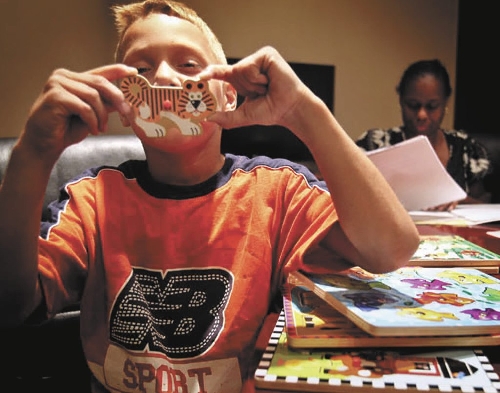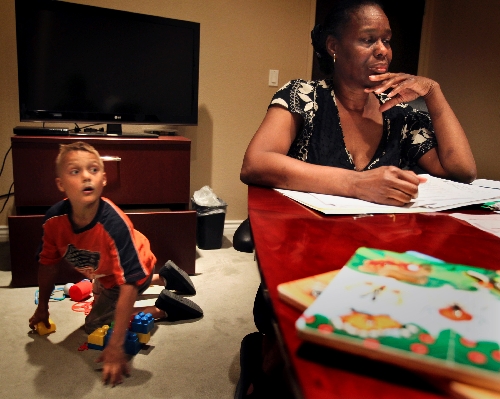Handcuffing of 8-year-old prompts change in school policy




At the time of his March 16 arrest, Tyrus Williams was no stranger to Clark County School District police.
More than a half-dozen incidents involving allegations against him had come to the attention of the force that patrols public schools.
Two days before his arrest, the special needs student diagnosed with cerebral palsy swung a backpack at a school aide, who was injured and broke a fingernail.
A Feb. 13 incident earned Tyrus a citation for felony battery on a school employee. He’s alleged to have stabbed a principal with a pencil, though no medical attention was needed.
In December, Tyrus was accused of biting another student and getting into fights.
After reviewing Tyrus’ history in the wake of the incident involving the aide, school police decided Tyrus needed to be brought before a judge. Tyrus was called to the office of Watson Elementary School in North Las Vegas where a school police officer secured the boy’s hands behind his back with metal cuffs. He was put in a patrol car and taken to the Clark County Juvenile Detention Center to be photographed, fingerprinted and placed in a holding cell.
He was held for about three hours without being allowed to talk to his grandmother.
Tyrus is 8 years old.
"I didn’t know where I was," said the second-grader, who remembers being scared.
He asked for his grandmother, but no one would let him call her, he said.
He cried.
Last week, a judge tossed out the juvenile criminal case against Tyrus, who stands 3 feet 4 inches tall and weighs less than 60 pounds. After hearing the case, Judge William Voy said the 8-year-old wasn’t competent.
Tyrus has become a catalyst for change, though. After a Las Vegas Review-Journal inquiry into his arrest, School District officials announced that the policy that allowed school police to handcuff the 8-year-old will be modified.
When Superintendent Dwight Jones learned of the case, he ordered a policy change to reflect that "juveniles of elementary age shall not be arrested and transported to any juvenile facility unless authorized by the chief of police."
Tyrus was born in 2003, the second child of a 17-year-old mother. He was premature, born at 28 weeks. He weighed less than 3 pounds.
Credia Hawkins was a foster parent who adopted Tyrus’ mother. A few years after Tyrus was born, his mother left her children. Hawkins, their grandmother, has been their guardian ever since.
Tyrus has grown up with developmental delays and was diagnosed with a mild case of cerebral palsy. He reacts violently to loud noises, his grandmother said.
"You can’t yell or scream at him," she said.
When he started school as a special needs student, an individualized education program was created for him. The plan set educational goals and spelled out what special services Tyrus required.
Hawkins, an advocate for her grandson who has become well versed in special education protocols, questioned whether the education plan created for Tyrus was working after he received a poor progress report.
Hawkins said she tried to work with Watson school officials to change her grandson’s individualized education program , a process she described as confrontational. She also worried that Tyrus was being ostracized at the school on Commerce Street, north of Ann Road, and that his teachers weren’t adhering to his special education plan.
School officials segregated Tyrus from other students, Hawkins said. He ate his meals alone, under the supervision of an aide. He was not allowed outside with other students at recess.
She repeatedly met with Tyrus’ teachers and other school officials, but to no avail, she said.
Tyrus continued to be documented for violent incidents.
Eventually, he was arrested.
A ‘RARE’ POLICE ACTION
School police Lt. Ken Young said officers followed department protocol in handcuffing Tyrus.
"It’s very rare for a person that age," he acknowledged.
The lieutenant said school police had been working with Watson’s staff since mid-December regarding Tyrus’ behavior. He said there were seven or eight incidents involving the boy.
"We have been very lenient, but at some point we had to take a stand and refer him to the juvenile court," he said.
Young described several circumstances where it would be appropriate to handcuff a child as young as Tyrus. One instance is when a child is out of control. Another is while transporting a child to the juvenile detention center.
Young said in the latter instance a child would be handcuffed and restrained by a seat belt in the back of a police cruiser. That is done for the safety of both the child and officer, he said.
Officers do try to resolve incidents with parents or guardians, Young said. They also talk with the student.
"We talk about their behavior and the consequences and making better choices," he said.
The lieutenant added that officers did visit Hawkins.
However, the number of incidents involving Tyrus reached a point where something more needed to be done, Young said.
Young, who was on the team that reviewed Tyrus’ case before his arrest, said it’s rare for school police to have to use the measures seen in his case.
Young said by getting Tyrus into the court system, police sought to accomplish two things. First, "that this young man gets the picture that this type of activity is not tolerated."
The second goal was to have a judge review the case and see whether there were services to help Tyrus that he wasn’t getting, such as counseling.
Young called cases involving students like Tyrus a double-edged sword. If police don’t move the case into the juvenile justice system, a victim may think police aren’t taking action. But taking action means some might view what happens as an overreaction, Young said.
CASE DISMISSED
Voy, after ruling Tyrus was not competent on Wednesday, discussed the boy’s case with Hawkins, defense attorney Monti Levy and chief deputy district attorney Brigid Duffy.
Voy quizzed the boy on his favorite activities, which include basketball and video games. The judge then asked Tyrus if he liked getting into trouble. Tyrus said no.
Voy also asked Hawkins a number of questions about Tyrus’ care. The boy is already in group therapy and regularly sees a psychiatrist and neurologist.
The judge also asked whether there had been violent outbursts at home. Hawkins said no.
"It sounds like a lot (of services) are in place. More than I usually see," said Voy, who praised Hawkins for her active role in Tyrus’ education and treatment. "A lot of parents just throw their hands up."
Hawkins told the judge that Tyrus hasn’t had problems in his new school, where he enrolled March 19.
"We’re on the same page," she said.
Duffy wants to track the case to see whether new incidents occur and whether Tyrus is getting effective help.
The district attorney’s office does not want to bring cases against 8-year-olds, Duffy said, but there were at least eight incidents involving Tyrus at Watson.
"We believe the child needs services," she said.
Voy said, "It seems to me the only reason I need to be involved is to make sure the school district is doing something. I think they should be dealing with it."
Voy told Hawkins to contact him if Tyrus has trouble at school again.
"You’re doing good," he told the grandmother.
At the close of the hearing, Voy asked Tyrus whether he understood what a promise was. Tyrus said he did.
"I promise not to see you again if you promise to keep your hands to yourself," Voy said.
Tyrus agreed.
Still, Duffy was wary. She said if the violent incidents continue, the next court hearing won’t be resolved so quickly.
Levy said Duffy did not take into account that even if there is another incident, the boy’s competency will still be an issue.
Outside of the courtroom, Hawkins said she was relieved the case has been dismissed.
Tyrus, sporting an overgrown Mohawk-style haircut, sat quietly through the hearing. Once it was over, he wrapped his arms around his grandmother’s waist and asked about the banana split he had been promised.
THE USE OF RESTRAINTS
Tyrus’ case continued to send ripples through the Clark County School District on Friday.
In addition to ordering a policy change, Superintendent Jones asked staff to research what the "best practices" are in such cases, spokeswoman Amanda Fulkerson said.
However, Tyrus’ attorney Levy and Hawkins still question whether a special needs child should ever be handcuffed. "This could have been resolved without his being arrested," Levy said. "The arrest was absolutely unnecessary."
Hawkins concurred. "They went there with the intent of handcuffing him," the grandmother said.
Police could have avoided using handcuffs by calling her, Hawkins said. She would have immediately gone to the school and driven him to juvenile detention herself.
Instead, Hawkins received a phone call saying she needed to meet police and her grandson at the juvenile detention facility.
Hawkins and Levy both question whether Tyrus was arrested as retaliation for Hawkins’ complaints about Watson school officials.
A day after the March 14 incident, Tyrus returned to Watson. On March 15, Hawkins met with school officials in a "heated" discussion about the boy’s education plan. The next day Tyrus was arrested and handcuffed.
Both Young and Fulkerson said the boy’s arrest was not retaliation for Hawkins’ complaints.
"We want what’s best for this child," Fulkerson said.
She added that the district has kept thorough documents in the case and school officials repeatedly tried to work with Hawkins.
Fulkerson said that according to those documents, Hawkins didn’t agree with the approach school officials suggested, including giving him an individualized education program .
Hawkins disputes that. She said she always felt Tyrus needed an IEP. But she didn’t feel the IEP was being followed. Hawkins revoked it in hopes of creating a new education plan, something that has been done at Tyrus’ new public school with success, she said.
Hawkins said she was glad Tyrus’ case prompted policy changes.
"I don’t want this to happen to another child," the grandmother said.
Contact reporter Francis McCabe at fmccabe@reviewjournal.com or 702-380-1039.












